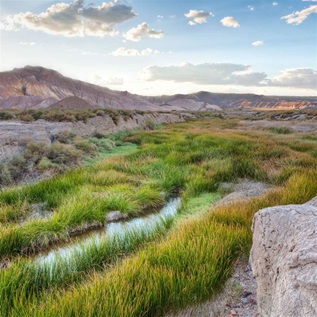Obama's Vacation Assignment: Reform Mining Law
It was a great idea, during the dog days of summer, for President Barack Obama and his family to do what 270 million others do each year, visit our national parks. These destinations are the best idea America ever had, argues award-winning filmmaker Ken Burns in a new documentary to be aired this fall. Burns contends that preserving the country's finest places for everyone to enjoy, not just the royal and the rich, is a concept as uniquely American as the Declaration of Independence.
Unfortunately, an obsolete 19th-century law that gives the mining industry the right of way at every turn is putting the popular and enduring program in jeopardy. In fact, it recently took emergency action to halt new claim-staking around Grand Canyon National Park, to respond to the threat of uranium mining. But neither this treasure nor dozens like it will be safe until Congress intervenes.
Signed by President Ulysses S. Grant with prospectors and pack mules in mind, the 1872 Mining Law allows gold, uranium and other hard-rock metals to be mined from most western public lands almost for free and with few restrictions. Today, with global corporations dominating mining, this means roughly $1 billion worth of precious metals are removed from public land without compensation, according to Congressional Budget Office estimates - a hefty sum for a federal government facing deep deficits.
Cleanup requirements minimal
Meanwhile, mining continues in and around dozens of national parks as well as most national forests. Ironically, for an industry the Environmental Protection Agency says produces more toxic waste than any other, cleanup requirements are minimal, even near Yellowstone, the world's first national park.
Yellowstone was an obvious choice for the presidential visit. But photo opportunities there might not be as pretty if the federal government hadn't spent $65 million two decades ago to stop a foreign-owned company from building the New World Mine within three miles of park boundaries.
The gold mine was to be accompanied by a waste impoundment site the size of nearly 70 football fields. Another costly environmental calamity exists not far from the ancient limestone petroglyphs and fabled Delicate Arch of Utah's Arches National Park, where one of the mining industry's worst sites can be found.
There, on the banks of the Colorado River, lies a 16-million-ton pile of radioactive waste from uranium mining. The Department of Energy estimates that it will take $1 billion and at least 20 years to clean up. Despite this, new mining claims continue to be staked around park boundaries with federal regulators basically powerless to halt the rush.
3,100 abandoned mine sites
And of course anyone traveling to California's Death Valley National Park or nearby Joshua Tree needs to watch his or her step because the federal government estimates that roughly 3,100 abandoned mine sites litter national parklands, many of which lie in these two desert gems.
That means being on the lookout for hidden shafts, unsafe structures or toxic gases in underground passages. Reform of the 1872 law should provide funding to clean up these hazards and help prevent them in the future.
Recently, the Obama administration signaled that revamping the antiquated mining law was long overdue. In July, Interior Secretary Ken Salazar issued a "time out" for new claim-staking on approximately 1 million acres of national forestland around Grand Canyon National Park, while initiating a process that could put them off limits for as long as 20 years. Salazar, a former U.S. senator from Colorado, knows a thing or two about the boom and bust nature of the industry and told a Senate committee that reform of the 1872 legislation would be a top priority for his department.
Many in Congress also believe it's time to act. The House of Representatives has previously passed a strong bipartisan reform bill, while a balanced package proposed by Senate Energy and Natural Resource Committee Chair Jeff Bingaman, D-N.M., is gaining momentum. Perhaps the president will return from his vacation with a new resolve to protect what he and his family have enjoyed. If national parks are indeed America's best idea, we shouldn't let them be harmed by an outdated mining law.
This article appears on The Billings Gazette Web site. Jane Danowitz is senior officer, Pew Environment Group and director, Mining Law Reform.






